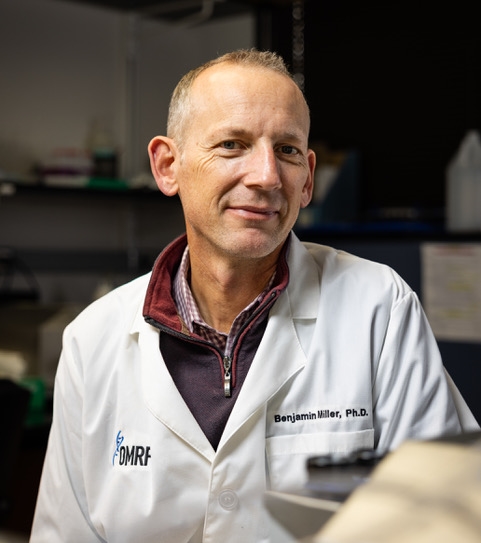The Arkansas Integrative Metabolic Research Center will host Benjamin Miller, member (professor equivalent) and program chair of the Aging and Metabolism Research Program at the Oklahoma Medical Research Foundation, at 12:55 p.m. Wednesday, March 8, in White Engineering Hall, room 209. Miller will discuss the advantages of stable isotopes, in particular deuterium oxide (D2O), for capturing dynamic events, and special considerations for rigorous assessments.
According to Miller: maintaining proteostasis is dependent on multiple integrated mechanisms including synthesis, breakdown, folding and translocation. Our lab is interested in the deterioration of proteostasis with age and disease — particularly how protein turnover impacts proteostatic maintenance. I will discuss the dynamic nature of proteostatic processes and how methods that capture movement aid mechanistic understanding of proteostatic maintenance. This talk will focus on the advantages of stable isotopes, in particular deuterium oxide (D2O), for capturing dynamic events, and special considerations for rigorous assessments. The goal is for the listener to gain an appreciation for how dynamic measurements help us target aging and age-related diseases.
Miller also co-directs the Metabolic Phenotyping Core in the Oklahoma Center for Cellular Metabolism Research COBRE and the Multiplexing Protein Analysis Core of the NIA-sponsored Oklahoma City Nathan Shock Center. The focus of Miller's lab is to translate basic biology of aging into treatments to increase human healthspan. Miller particularly focuses on proteostatic mechanisms in mitochondria to increase stress resistance for slowing aging. These studies concentrate primarily on skeletal muscle in hopes of minimizing age-associated sarcopenia. His laboratory is a leader in the use of stable isotopes for measurements of cellular/protein turnover and metabolic flux.
This seminar will also be available via Zoom.
This event is supported by the NIGMS of the National Institutes of Health under award number P20GM139768. The content is solely the responsibility of the authors and does not necessarily represent the official views of the National Institutes of Health.
Topics
Contacts
Macey Graham, communications graduate assistant
Division for Research and Innovation
816-447-8965,
Andy Albertson, senior director of communications
Research and Economic Development
479-575-6111,
